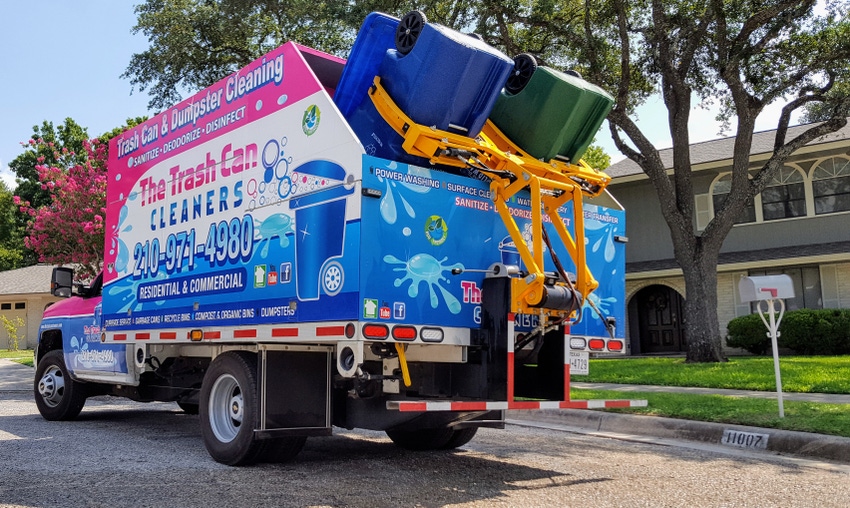A majority female-owned business, The Trash Can Cleaners is a new business offering cleaning services to San Antonio residents.

There’s no doubt about it, trash stinks.
And when you toss trash, recycling and organics into solid waste and recycling carts for a week at a time, those carts can stink, too.
For San Antonio residents, there’s a new weapon: The Trash Can Cleaners, a mobile automated and self-contained cart cleaning service that comes to the curb following trash service and cleans and sanitizes carts. A majority female-owned business, The Trash Can Cleaners began as idea tossed around by Brannon Fowler. Previously, Fowler had run a pressure washer business that specialized in cleaning oil drilling rigs. Eventually, he started making biodegradable soaps that washed the oil rigs with an environmentally safe cleaner.
But the ups and downs of the oil and gas industry made for some uncertain times, and Fowler was looking for something more consistent. A few years ago he’d heard of some power-washing businesses that were cleaning trash carts. He sat on the idea for a while before going to his wife, Mary Ann.
She agreed to take charge of the day-to-day operations while Fowler, with his knowledge of pressure washers, cleaning and chemicals works on the sales and marketing side of things.
And as luck would have it, they have some good friends, Brandon and Lisa Brzozowski, who run a high-end mechanical business working on diesel engines and RV repair—the kind mechanical work with mobile maintenance and 24-hour service.
The four of them came together as a team with Lisa and Mary Ann as majority owners. Most calls to the San Antonio business are answered by Mary Ann, who also is charged with invoicing and collections.
Brandon heads up the mechanical side of things working on and building trucks and maintaining the equipment. Lisa handles daily operations, equipment ordering, collections, accounting, insurance and legal side.
Each one brings a different skill set making up what Fowler says is a great partnership.
So what had been an idea, began to take shape and the team was ready to purchase the equipment to get started.
“We thought we were going to buy something on the market,” Fowler says. “We went to the market and looked at what was out there and pretty quickly realized that with our skill sets we could actually put together something better than what we could buy.”
And so we decided we would take what was on the market and see if we could make improvements and design a truck that was a little cleaner—maybe a little more professional, maybe using higher-end components if possible. So that’s what we did.”
The result is a self-contained, high-powered pressure washer that cleans and sanitizes cans and can even deodorize by adding a pleasant scent like mint to the cart.
In June, The Trash Can Cleaners began servicing its San Antonio customers and now has nearly 400 customers, and has placed bids for home owners associations with as many as 1,300 homes where it could possibly clean every can of every house.
For now, the focus is on the residential side of things, says Fowler, though they’re starting to pick up some business on the commercial side of things, as well. Plus, there’s a another part to the commercial side—building trucks for others to start their own cart-cleaning business.
“It’s been very popular in San Antonio,” he says. “It’s obviously something that’s catching on on a national level. And because of, I think, of how effective and well-built our equipment is, we’ve had a lot of interest in building and selling these units for other people.”
The units can be designed to the needs of the business. And with experience as small business owners, Fowler says they can help others get off to a good start.
“We were cash-flow positive our first month,” he says.
Putting to use the mechanical/manufacturing side, the company is building trucks and trailer units and even a stationary units for a waste company at their yard so they can keep cans clean.
The process uses high-pressure (3,500 psi), hot water (at 190 degrees) to sanitize the can. It captures any residual waste left in the can after service and disposes it responsibly.
“We’re not leaving a mess with a bunch of chemicals in your road that’s going to run down your street into your gutters in the front of your house. The truck actually collects that. But another great thing is it’s a pretty chemical-free process. We’re using high-pressure, hot water that basically strips all that nastiness out of the can, catches the waste in the truck, and we haul it off so that you don’t have to worry about the mess.”
Right now, The Trash Can Cleaners is managing its customer load with one truck. As the business grows, they have plans to add a second truck and so on as needed to service the city.
And the trucks are versatile. They can be used for pressure washing, driveway cleaning and the The Trash Can Cleaners truck is set up to wash dumpsters for businesses—washing with the hot water and sucking the water back out as needed.
Fowler says there are millions of trash bins in large cities and in many areas more to come as composting becomes the rule in cities like San Antonio, where households now have three separate bins: one for trash, one for recycling and one for organics.
There is opportunity for this type of business in both small towns and big, depending on what services a company wants to provide, he adds. Even in a large populated area like San Antonio, no one had been providing the service before The Trash Can Cleaners.
A lot of people think it’s a service for the wealthy but in reality it’s not, says Fowler. The majority of customers are busy working families that like the convenience of the service.
About the Author(s)
You May Also Like


